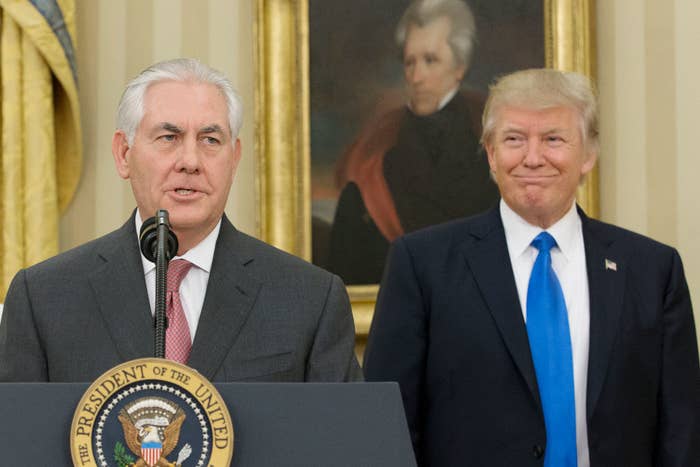
As agenda items go, the future of the planet is a biggie. And that’s arguably what’s on the table in the White House this week, as President Trump’s senior advisors will reportedly debate whether the US should withdraw from the historic Paris agreement on climate change.
On the campaign trail, Trump repeatedly vowed to cancel the December 2015 deal, under which more than 190 nations pledged to reduce their emissions of greenhouse gases. But within the Trump administration, there’s a big split on the issue.
The “keep the deal” camp is led by Trump’s son-in-law Jared Kushner and Secretary of State Rex Tillerson, according to Politico, which last week reported that a showdown meeting of senior advisers would take place as early as today. National Security Adviser H.R. McMaster is also reportedly leaning in favor of staying in the climate accord. The “leave” faction is headed by Environmental Protection Agency head Scott Pruitt and chief strategist Steve Bannon.
It’s already clear that the US is not going to meet its Paris pledge to cut emissions by more than 26% from 2005 levels by 2025. Almost half of that target depended on the Obama-era Clean Power Plan. This would have slashed electricity generation using coal, but was ditched by a Trump executive order signed late last month.
Adding in other policies on limiting emissions that are now dead on arrival, the US is probably on course only to cut its emissions by about 6% by 2025, according to calculations run by Marc Hafstead of Resources for the Future (RFF) in Washington DC.
“Really the only way we could get back to 26% would be if states, cities, and businesses were to do all of the work — which seems incredibly unlikely,” Hafstead told BuzzFeed News.
That alone won’t please other signatories to the Paris deal. But walking away from the accord entirely would raise tensions to another level.
"The greatest international reaction would be around full-scale withdrawal from the agreement," David Waskow, director of the International Climate Initiative at the World Resources Institute in Washington DC, told BuzzFeed News.
There are pragmatic reasons for the Trump administration to stay in the agreement even as it allows the US pledge on emissions reductions to slide. In future meetings, the deal’s signatories will discuss arrangements for investing in clean technology for the developing world. And if the US isn’t a party to the Paris agreement, it will have no say in how these and other policies are set up.
"If you're Goldman Sachs, you might like to have your home country involved," Raymond Kopp, a senior fellow with RFF, told BuzzFeed News.
That’s a telling reference, given that the investment bank’s former president Gary Cohn, now head of Trump’s National Economic Council, has reportedly become a key figure in the administration, while Bannon’s star has waned.
Leaving would achieve little other than antagonizing other countries.
What’s more, the Paris agreement was never intended to provide binding targets, so leaving would achieve little other than antagonizing other countries.
"My expectation is that they're going to stay inside and they're going to adjust the pledge," David Victor, director of the Laboratory on International Law and Regulation at the University of California, San Diego, told BuzzFeed News. Pulling out of such a flexible agreement would be like “poking everyone in the eye with a stick,” he added.
Still, the fact that the US isn’t going to meet its current pledge will make a big difference to what the Paris deal can achieve.
To avoid the worst consequences of warming, climate scientists have argued that the rise in global temperatures should be kept within 2 degrees Celsius of the pre-industrial average by 2100. Even with the Obama administration’s pledge, the planet was poised to warm by 3.3 degrees C, according to Climate Interactive, a nonprofit that calculates the effects of climate policies, working closely with scientists at MIT.
The Trump administration’s policies are poised to warm the planet by a further 0.3 degrees C, Drew Jones, co-director of Climate Interactive, told BuzzFeed News. Another fear is that other countries will now also let their targets slide.
“That puts us back on a trajectory of 4 to 4.5 degrees C of warming, which is likely to be catastrophic,” John Sterman, director of the MIT Sloan Sustainability Initiative, told BuzzFeed News.
Victor is optimistic that other nations will hold firm, however. China and India, he said, want to reduce reliance on coal to reduce crippling air pollution. The European Union, meanwhile, is struggling to meet its stated target of reducing emissions at least 40% below 1990 levels by 2030. But with environmental cooperation seen as one of the successes of the often troubled European project, Victor doesn’t expect to see a major retreat.
"My guess, if anything, is that they're going to redouble their efforts," he said.
